By Santorini Dave • dave@santorinidave.com
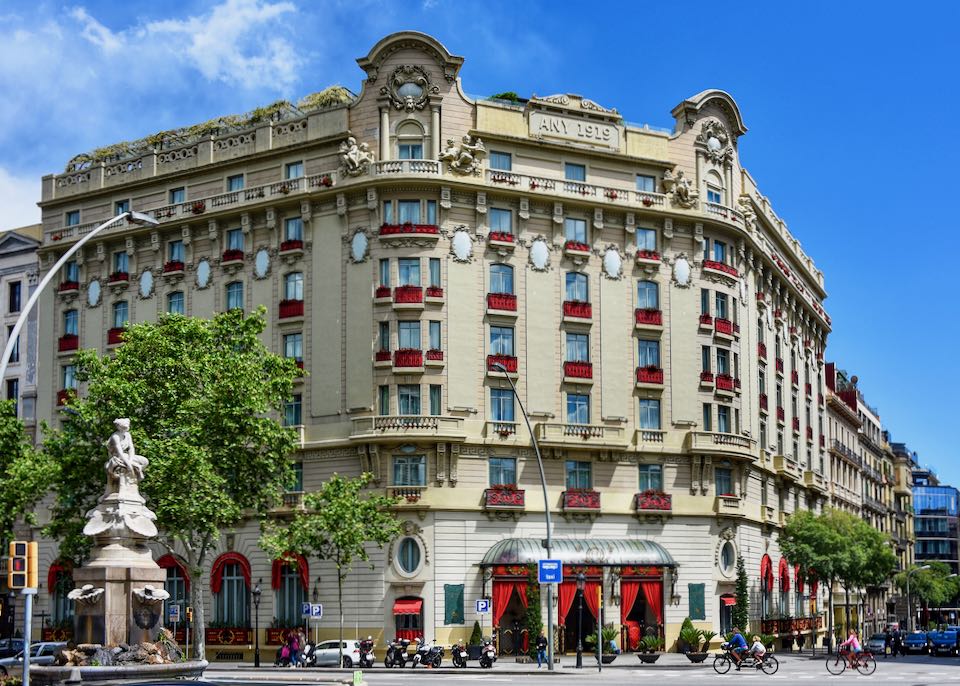
El Palace is my favorite luxury hotel in Barcelona. Central location and great for first time visitors.
The Best Areas to Stay in Barcelona
My Favorite Hotels in Barcelona
- 5-Star: El Palace • Cotton House
- 4-Star: Mercer Hotel
- 3-Star: Praktik Rambla
- Families & Pool: Grand Hotel Central
- For Couples: Hotel Bagués
- Near Beach: Hotel Arts
- Cruise Port: Grand Marina
- Kitchen Suite: Citadines Ramblas
- Best New Hotel: Borneta
- Airport: Sleep & Fly
I love Barcelona. It’s a big, cosmopolitan city but its historic center is compact, walkable, vibrant, and an absolute delight to explore.
Unless you visit in mid-winter, expect it to be extremely busy, with parts of La Rambla occasionally resembling Times Square on New Year’s Eve. What draws crowds more than anything else is the architectural legacy of Antoni Gaudí, the king of Catalan Modernism: Park Güell, Casa Batlló, Casa Milà (La Pedrera), Palau Güell, and above all the mesmerizing Sagrada Família are all fantastic must-see attractions. The good news is that it’s relatively easy to lose the crowds, whether in the winding streets of Barri Gòtic or on the slopes of Montjuïc, and there is a huge stock of accommodation to suit every budget.
I find it useful to think of Barcelona as three distinct cities. At its heart is the Ciutat Vella, the old city, comprising the narrow streets, crumbling towers, and plazas of the Barri Gòtic, El Born, and El Raval neighborhoods. Surrounding this is the “New City”: the Eixample, built in the 19th-century on a more orderly grid plan. Beyond this are the vast swathes of modern suburbs built up after World War II. Many of the most charming hotels in Barcelona are dotted around the upscale Eixample neighborhood, though central Barri Gòtic and El Born also have their share of 4 and 5-star accommodations. Gràcia and Poblenou both have a good range of family-friendly accommodation, though the two neighborhoods are farther away from many of Barcelona’s attractions.
Barcelona Neighborhoods
Many of my favorite things to do in Barcelona are centrally located, but there are some that require a short metro ride, so your choice of neighborhoods to stay in will make a difference in what you are able to see and how you get there.
All the central Ciutat Vella (Old City) districts of Barcelona are extremely atmospheric, but can be mobbed by tourists by day and can seem a little edgy at night. Barri Gòtic is Barcelona’s historical and geographical center, a 20-minute walk from numerous attractions and most other neighborhoods of interest. A romantic tangle of medieval streets and plazas, this part of the city has been inhabited since Roman times and is home to the city’s Gothic cathedral. It also attracts the tourist crowds, and with good reason: it’s an all-rounder, offering great dining, shopping, and numerous places to stay.
Hotel Bagues on La Rambla, the tree-lined pedestrian street that runs through central Barcelona for 1 km. La Rambla is the boundary between the quarters of Barri Gòtic, to the east, and El Raval, to the west.
Good hotels on or near La Rambla: Hotel Bagues • Hotel 1898 • Praktik Rambla • Casa Camper • Sonder DO Plaça Reial • Aparthotel Arai • Ramblas Apartments
Barcelona’s iconic pedestrian thoroughfare, La Rambla, separates Barri Gòtic from the edgy, arty neighborhood of El Raval. Formerly one of the roughest parts of town, El Raval has mostly shed its negative image through gradual gentrification, though its independent character is still very much on display in its quirky stores, independent boutiques, and bars.
To the east of Barri Gòtic is El Born, another maze of medieval streets with popular attractions of its own, ranging from the highbrow Picasso Museum to the family-friendly Chocolate Museum. There are plenty of tapas bars and boutiques in this area, as well as the vast Ciutadella Park that separates El Born from the hip neighborhood of Poblenou.
Bordering the Old City to the northwest is Eixample (the “new city”, literally “the addition”), the expansive, upscale neighborhood whose bright, tree-lined avenues are a complete contrast to the Ciutat Vella’s dark and narrow streets. Here you’ll find most of Barcelona’s striking Modernist buildings, including Gaudi’s Sagrada Familia, as well as the city’s most upscale shopping. At the southwestern edge of Eixample is the sub-neighborhood Sant Antoni, a foodie enclave, with plenty of contemporary tapas bars, fusion restaurants, and buzzy nightlife.
Further northwest, between Eixample and the hills, is Gràcia – a village within a city. A largely residential neighborhood populated with young families and arty types, it’s home to Gaudi’s popular Park Güell.
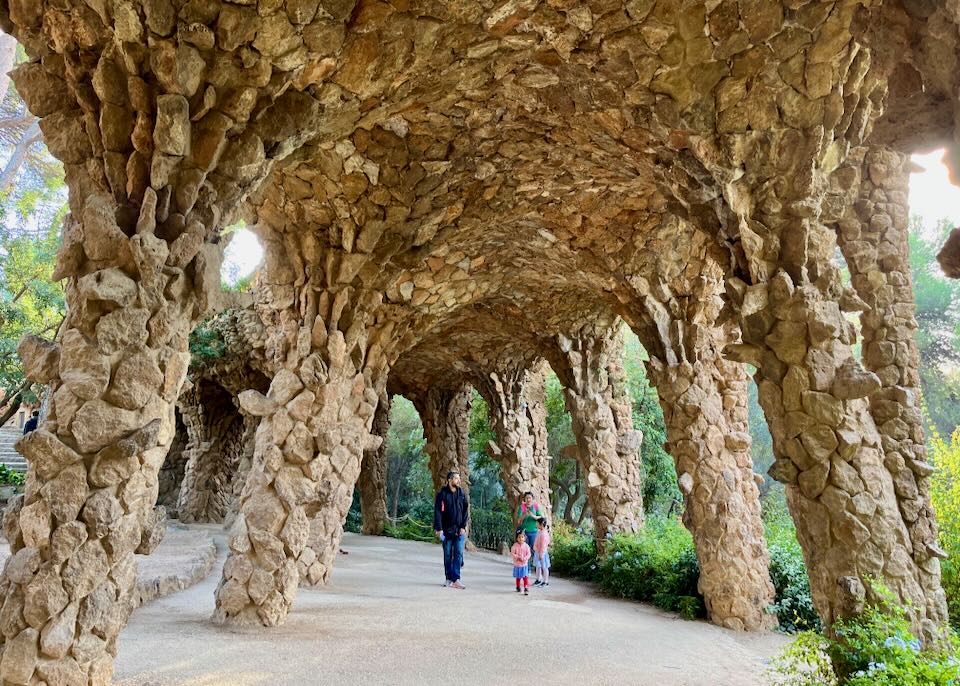
Parc Guell
The trendy neighborhood of Poble Sec stretches across the base of Montjuïc hill and is adjacent to El Raval south of the Avinguda del Paral·lel, lined with restaurants and lively bars. Aside from a street full of tapas bars, Poble Sec itself has no attractions to speak of, but it makes an ideal base for exploring Montjuïc’s stellar art museums and hilltop fortress via cable car and on foot.
Montjuïc (meaning “Jewish Mountain”) is a gorgeous hilltop named for the Jewish cemetery founded here in the medieval period, and is connected to the city by funicular and cable car. The hilltop is relatively flat and mostly parkland filled with lush botanical gardens, art museums, and a 17th-century fortress, all providing sweeping views over the port. There are few hotels and restaurants on Montjuïc; it’s a very quiet space. The nearest hotel and restaurant cluster is in Poble Sec.
From Montjuïc, a second cable car traverses Barcelona’s yachting marina at Port Vell, connecting to Barceloneta, a former fishing village known for its seafood-heavy tapas bars and restaurants, as well as Barcelona’s liveliest beach. Barceloneta is also an easy walk from both El Born and Barri Gòtic, making it convenient to combine sightseeing in Barcelona’s center with a day at the beach.
Further northeast up the coast and bordering Barceloneta is El Poblenou – all cutting-edge architecture, pumping nightlife, and beaches (it has five.) Poblenou is quite far from the city’s main attractions, but ideal if you’re looking for a beach holiday combined with intensive clubbing.
Getting Around Barcelona
While it’s relatively easy to explore Barcelona’s historic center on foot, it’s a big city and you’ll need to use its excellent public transport system to go further afield. The system comprises metro (subway), trams, and buses, with integrated single tickets (€2.40) and 24-hour tickets (from €10.50) valid throughout. For visitors, the Hola Barcelona Travel Card provides unlimited journeys on public transport in Barcelona for consecutive periods of 2, 3, 4, or 5 days, including trips to Barcelona-El Prat Airport.
It can be useful to have a rental car when exploring the Catalunya region around the city, but there’s really no need to use one in Barcelona itself – streets are narrow, often congested, and parking can be tough to find, especially in the city center.
Bike rental is available through traditional shops such as Barcelona Rent a Bike (bikeshare scheme Bicing is open to locals only). With over 125 miles (200km) of dedicated bike lanes, Barcelona can be a pleasant place to ride, though navigating the narrow, packed streets of the old city can be a hassle on a bicycle.
The Best Places to Stay in Barcelona
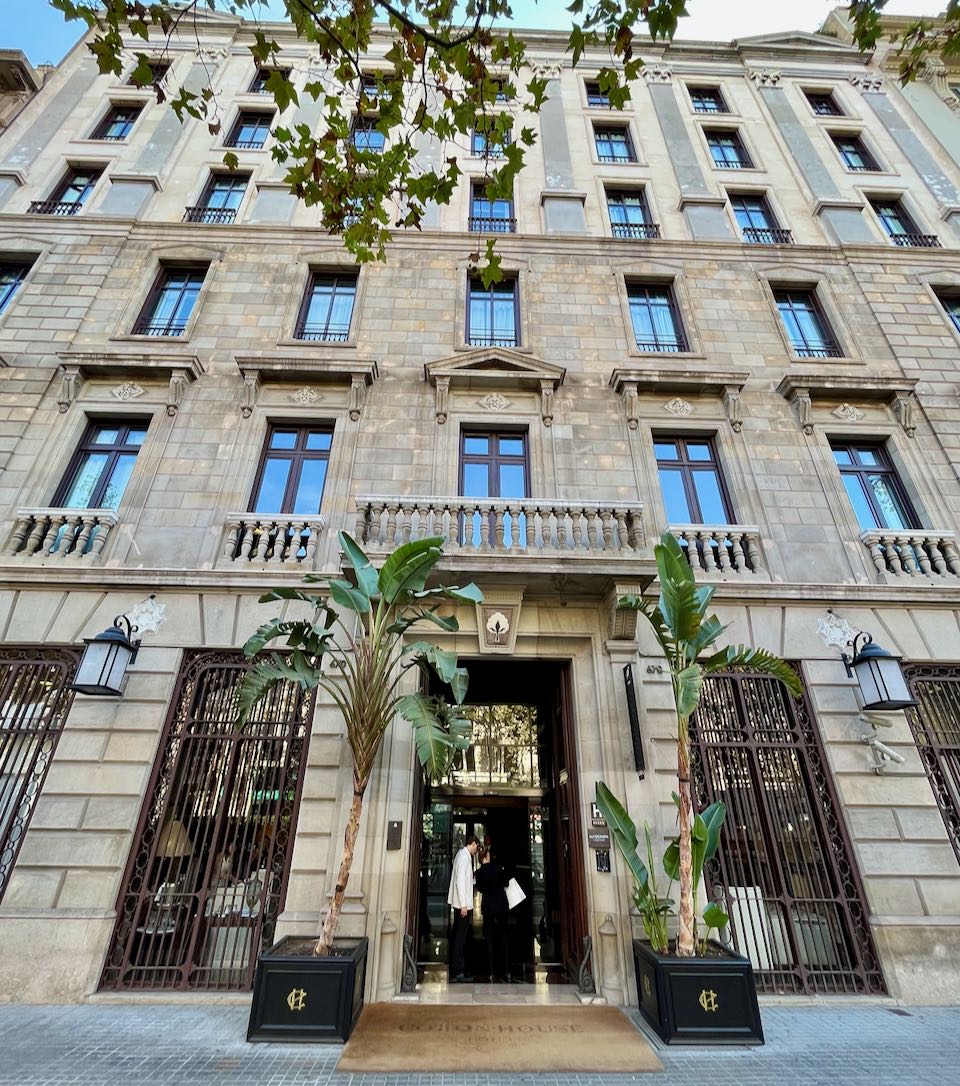
The Cotton House hotel in in Eixample.
- Best Luxury Hotels in Barcelona
Cotton House • El Palace • Condes de Barcelona • Mandarin Oriental- Best Boutique Hotels in Barcelona
Hotel Bagués • Casa Camper • Casa Sagnier • Mercer Hotel • Neri- Best Barcelona Beach Hotels
Hotel Arts • W Hotel • H10 Port Vell • Sofitel Barcelona Skipper • Hotel 54 Barceloneta- Best Cheap/Midrange Hotels in Barcelona
Hostal Oliva • Ciutat de Barcelona • Praktik Rambla • Chic & Basic Born- Best Hostels in Barcelona
Fabrizzios Terrace • Onefam Batlló • Ítaca Hostel- Best Barcelona Hotels for Families
Aparthotel Arai • Grand Hotel Central • Eurostars Grand MarinaOur suite (family room) at Aparthotel Arai in Barcelona.
Best Areas in Barcelona for…
- Best Neighborhoods in Barcelona for Sightseeing: Barri Gòtic, Eixample, Poble Sec
If you’re looking to lose yourself among medieval lanes and admire the city’s oldest architecture, then Barri Gòtic is the place for you. If you’re more interested in Barcelona’s Modernist masterpieces, such as the Sagrada Familia, then Eixample should be your destination. Lovers of contemporary and classical art may wish to consider Poble Sec for its proximity to the art museums both on Montjuïc and in El Raval.- Best Neighborhoods in Barcelona for Nightlife: Poblenou/Port Olimpic, Barri Gòtic, El Raval, El Born, Eixample
There isn’t a single best area in Barcelona for nightlife; instead, several neighborhoods cater to the city’s night owls. If you’re into serious clubbing, head out of the center to Poblenou and Port Olimpic for beachside super-clubs that party until sunrise. Fun spots include CDLC, Opium, world-famous Pacha, and Shôko. Further north in Poblenou is excellent Razzmatazz.Eixample is locally nicknamed ‘Beerxample’ for its proliferation of craft beer bars, but there are plenty of upscale tapas and cocktail bars here as well. For beers, check out BierCaB, CocoVail Beer Hall, and Conesa Beer, or go to Slow Barcelona for club nights and La Whiskeria for cocktails. Barcelona’s main LGBT nightlife zone is also here (the so-called “Gaixample”), with most gay-friendly bars and clubs on Carrer de Villarroel and Consell de Cent.
El Born, Barri Gòtic, and edgier El Raval (with La Rambla in between) all have clusters of lively tapas bars that cater to any taste and stay open until the wee hours of the morning, as well as cocktail bars. Top spots include Boadas Cocktails and The Wild Rover, oneof many Irish pubs around here. The clubs and live music venues around Plaça Reial attract a young international crowd: Jamboree, Sidecar, and Los Tarantos (for flamenco). In El Raval we like the cocktails at Bar Makinavaja and the clubnights at Moog.
- Best Neighborhoods in Barcelona for Food and Restaurants: Eixample, Barceloneta, Barri Gòtic, El Born, El Raval
Eixample is particularly good for Michelin-starred restaurants and fine dining (Angle, Besta, Disfrutar, and Lasarte are top examples), especially in the southwestern part called San Antoni, a foodie heaven featuring lauded spots like Maleducat. There are plenty of wallet-friendly options, too, particularly the traditional tapas bars and hipster cafes along Carrer del Parlament (try Els Sortidors del Parlament).Barceloneta is the place to go for fish and seafood (Can Solé and La Cova Fumada). Barri Gòtic and El Born have a good mix of lively tapas bars, both traditional and contemporary (try Bodega La Puntual, El Xampanyet, and ELDISET), as well as more upscale fusion offerings. El Raval has a number of hip restaurants, including several vegetarian options, as well as some great tapas bars. The Boqueria Market just of La Rambla is justly popular for its myriad food and snack stalls (go early in the morning to avoid the biggest crowds).
Els Quatro Gats in Barri Gotic was a onetime hub for Barcelona’s Modernisme movement.
- Best Neighborhoods in Barcelona for Families: Barri Gòtic, El Born, Gràcia, Barceloneta
Barri Gòtic appeals to families because it’s very central, very walkable, and close to many attractions. El Born is similar in that respect, with the added bonus of having the Parc de la Ciutadella next door, with the city’s zoo and open spaces for the kids to run around in. Barceloneta is great if you want to be near the beach and the attractions in the heart of Barcelona, while Gràcia is a quiet neighborhood in which you can mingle with local families in the many tiny parks and plazas – and its Park Güell is particularly fun for kids.- Most Romantic Neighborhood in Barcelona: Barri Gòtic
Montjuïc is ideal if you’re looking for romantic isolation, great views, and hilly, landscaped gardens to wander around. Eixample, with its strollable wide boulevards, lined with beautiful Modernist architecture and home to some of Barcelona’s most luxurious hotels, is another great pick. But if you’re looking for tiny, atmospheric, dimly lit streets, beautiful plazas to sip a drink in, cozy boutique hotels, and medieval splendor, Barri Gòtic’s your best bet.- Best Neighborhoods in Barcelona to Stay for First Timers: Barri Gòtic, Eixample
If it’s your first time in Barcelona, then you probably want to base yourself near the heavyweight attractions. For Modernist architecture, including the incomparable Sagrada Familia, Eixample is your best bet. For exploring the heart of the city, Barri Gòtic is ideal, especially since it’s an easy walk to El Born, El Raval and Eixample, and a short metro ride to attractions further out on Montjuïc and Gràcia.- Best Neighborhood in Barcelona for a Local Vibe: El Raval or Gràcia
Dynamic, bohemian, and ethnically diverse, El Raval is Barcelona’s counterculture neighborhood with a highly independent character. Notorious as the city’s former red-light district, it retains some of its former edginess, though these days it’s more known for its art, youthful vibe, and independent shops. Gràcia is the best place to escape the tourists, with its tranquil plazas and cafés full of locals and an appealing small-town atmosphere.- Best Neighborhoods in Barcelona for Beaches: Barceloneta, Poblenou
Barceloneta has the closest beach to the center of Barcelona, within easy walking distance from La Rambla. It’s also Barcelona’s longest beach, and popular with families. Poblenou has a string of five clean beaches, separated by breakwaters; these are further away from the city’s other attractions, though.Gaudi’s yet-unfinished masterpiece, La Sagrada Familia.
- Best Neighborhood in Barcelona for Walking: Barri Gòtic and El Born
Barri Gòtic’s maze of tiny lanes and streets, many of them closed off to cars, is a real joy to explore on foot and get lost in, with much of Barcelona’s beautiful, centuries-old architecture to discover along the way. That said, El Born, Barri Gòtic’s neighbor, is another extremely walkable part of the Old City, and much of it also pedestrianized.- Safest Areas of Barcelona
Barcelona’s safest areas tend to be the more affluent neighborhoods, such as Eixample, Poble Sec, and Poblenou. Though many of Barcelona’s neighborhoods are generally safe to walk around at any time of day, it’s a good idea to watch out for pickpockets in particularly crowded places.- Unsafe Areas of Barcelona
Parts of El Raval, and the Sants area around the train station, north of Montjuïc, can be sketchy at night. It’s also best to avoid tiny, deserted streets in Barri Gòtic and El Born late at night and stick to well-lit streets with more people. Opportunistic pickpockets operate along La Rambla and the La Boqueria food market, and parts of Barri Gòtic, El Born, and El Raval can get lively in the evenings with drunken bachelor and bachelorette parties. El Raval is much safer than it once was, but still suffers from a relatively high crime rate, drug activity, and a large homeless population – be watchful of handheld devices (phones etc), which can get snatched.
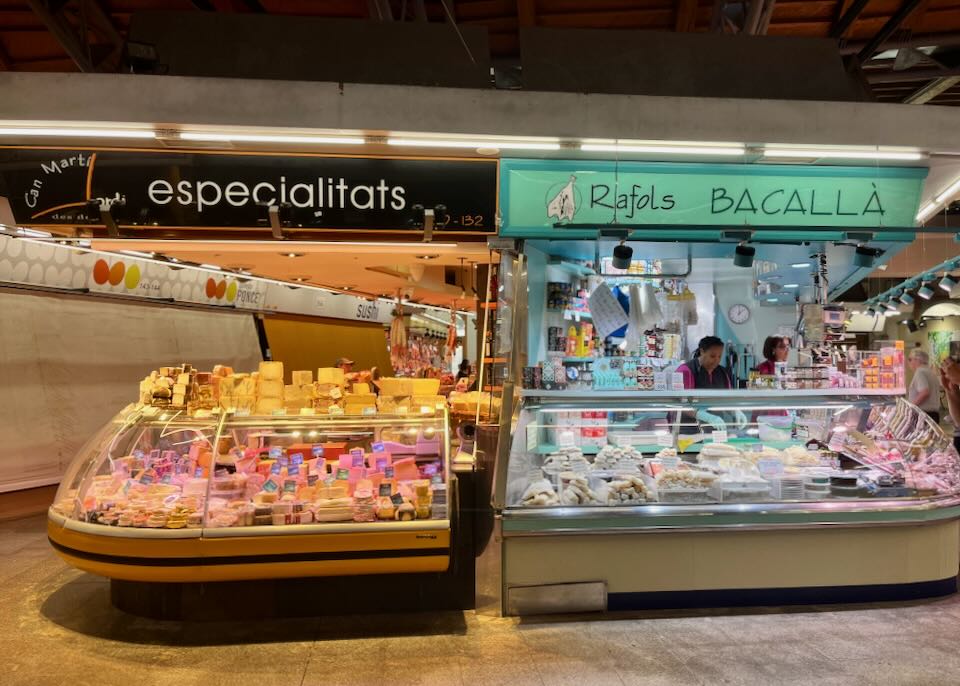
Stalls at the Santa Caterina Market in El Born.
The 9 Best Neighborhoods in Barcelona for Tourists
1. Barri Gòtic & La Rambla
If you’re looking to stay in the heart of Barcelona, you can’t get more central than the medieval Barri Gòtic – the city’s historical core. Amidst the Gothic Quarter’s narrow, maze-like streets, you’ll find a dense concentration of tapas bars, restaurants, and small boutiques – particularly along Carrer dels Banys Nous. There are also charming plazas such as arcaded Plaça Reial, and beautiful landmarks such as the Pont Gòtic on Carrer Bisbe; remnants of Roman ruins peek out from beneath Baroque and Gothic buildings.
The Gothic Quarter is bordered to the southwest by La Rambla – Barcelona’s famous (and largely pedestrianized) boulevard, perpetually crowded with locals, visitors, street performers, and vendors. There are plenty of mediocre tourist trap resaurants here, with the exception of tapas stalls around the popular La Boqueria food market, but excellent food can be found just a block or two off La Rambla, from simple tapas bars to sophisticated, contemporary dining. The Gothic Quarter’s main draw is its historical ambiance; attractions here include the impressive Gothic cathedral, the Museu d’Historia de Barcelona (which preserves underground Roman remains), the art and sculpture at Museu Frederic Marès, and several appealing churches – 11th-century Santa María del Pi the most notable.
There are some excellent boutique hotels here, but the best places tend to be very expensive, with a few good budget options noted below.
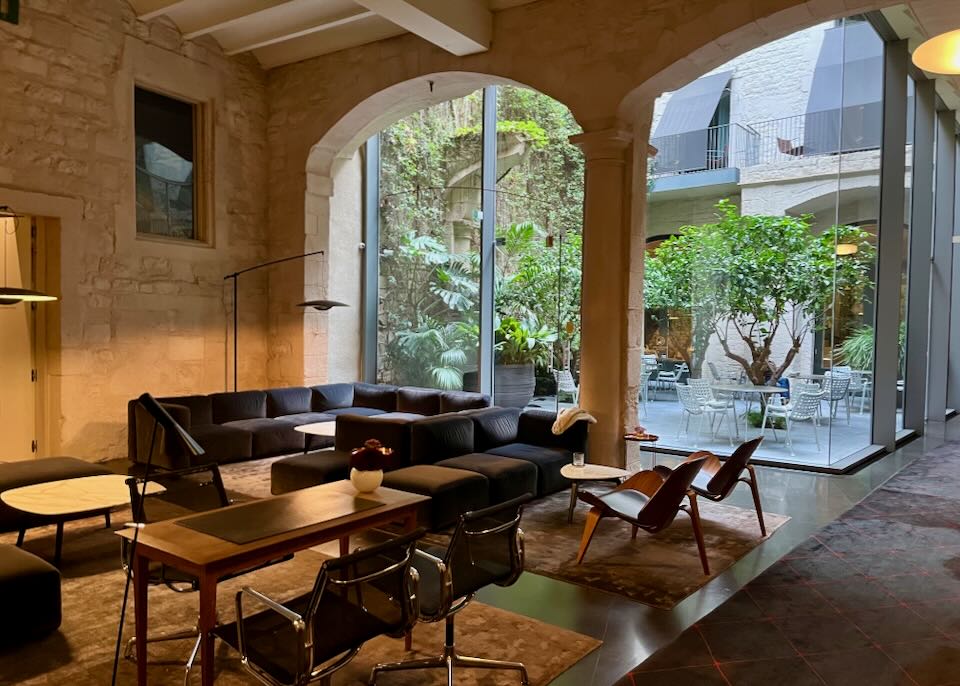
The exceptional boutique Mercer Hotel in the Gothic Quarter features a lovely garden courtyard and a rooftop swimming pool.
- Best Hotels in Barri Gòtic & Las Rambla
Aparthotel Arai • Hotel phone: +34 933 20 39 50
H10 Cubik • Hotel phone: +34 933 20 22 00
Hotel Bagués • Hotel phone: +34 933 43 50 00
Hotel Catalonia Catedral • Hotel phone: +34 933 43 67 75
DO Plaça Reial • Hotel phone: +34 618 56 78 74
Kimpton Vividora Barcelona • Hotel phone: +34 936 42 54 00
Mercer Hotel • Hotel phone: +34 933 10 74 80
Hotel Neri • Hotel phone: +34 933 04 06 55
Ohla Barcelona • Hotel phone: +34 933 41 50 50
Serras Hotel • Hotel phone: +34 936 06 16 32
Yurbban Ramblas • Hotel phone: +34 933 17 48 98- Best Cheap/Midrange Hotels
H10 Racó del Pi • Hotel phone: +34 933 42 61 90
Hotel Cantón • Hotel phone: +34 933 17 30 19
Citadines Ramblas • Hotel phone: +34 932 70 11 11
Hotel Denit • Hotel phone: +34 935 45 40 00
Hotel Nouvel • Hotel phone: +34 933 01 82 74
Hostal Mare Nostrum • Hotel phone: +34 933 18 53 40- Best Hostels
Ítaca Hostel • Hotel phone: +34 933 01 97 51
Kabul Party Hostel • Hotel phone: +34 933 18 51 902. El Raval
Adjacent to Barri Gòtic and west of La Rambla, El Raval is an edgier melting pot of a neighborhood that’s worked hard to shed its seedy reputation as Barcelona’s former red-light district (aka Barri Xinès, anchored by Nou de la Rambla) – though it still pays to watch your wallet. These days, El Raval attracts bohemian types, artists, and foodies, and is home both to the MACBA contemporary art museum and Palau Güell, one of Gaudí’s lesser-known buildings completed in the 1880s (its interior has been artfully preserved and is open for tours).
El Raval’s picturesque Sant Pau del Camp is likely the oldest church in Barcelona.
For the best vintage fashion boutiques and quirky arts and crafts shops, head for Carrer Tallers and Carrer de Riera Baixa. El Raval is also known for global cuisine, hip tapas bars, and vegetarian restaurants, with the densest dining clusters around Carrer del Dr. Nou, Carrer Pintor Fortuny, and Carrer Joaquin Costa.
El Raval has some of the best-value accommodation in central Barcelona, along with one-of-a-kind boutique hotels and a couple of luxury options. Most of the budget hotels here are poor quality, but exceptions are noted below.
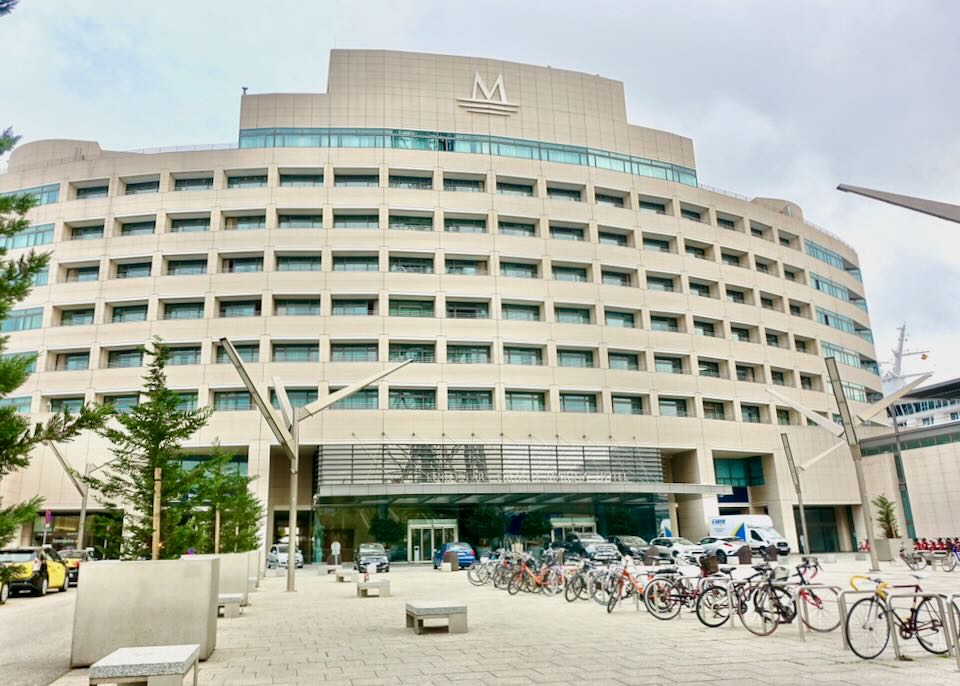
Eurostars Grand Marina in El Raval is one of Barcelona’s best hotels for families.
- Best Hotels in El Raval
Antiga Casa Buenavista • Hotel phone: +34 933 30 30 30
Eurostars Grand Marina • Hotel phone: +34 936 03 90 00
Eco Boutique Hostal Grau • Hotel phone: +34 933 01 81 35
Casa Camper • Hotel phone: +34 933 42 62 80- Best Cheap/Midrange Hotels
Andante Hotel • Hotel phone: +34 934 41 25 45
Ciutat Vella • Hotel phone: +34 934 81 37 99
Niu Barcelona • Hotel phone: +34 936 55 02 55
Sixties Ramblas • Hotel phone: +34 933 02 71 11- Best Hostel
St Christopher’s Inn • Hotel phone: +349317514013. El Born
El Born is part of the Ciutat Vella (Old City), separated from the Barri Gòtic to the south by the Via Laietana. It’s a maze of tiny streets that are a little quieter than its neighbor, but not at all short of attractions. The Picasso Museum is here (the artist left many of his works to the museum when he died in 1971), as is El Born Centre de Cultura i Memòria (a 19th-century market hall displaying excavated remnants of an 18th-century neighborhood), Museu Etnològic i de Cultures del Món (world cultures museum), Chocolate Museum, the European Museum of Modern Art, and the Moco Museum of contemporary art. El Born’s primary church of Santa Maria del Mar is one of the city’s most beautiful examples of Catalan-Gothic architecture. Northwest of here is the stunning modernist masterpiece concert hall Palau de la Música Catalana, built in 1908 to a design by Lluís Domènech i Montaner.
El Born Centre de Cultura i Memòria
Though it’s a shorter walk to Barceloneta’s beach from El Born than from Barri Gòtic, its streets are still dense with tapas bars, restaurants, coffee shops, and vintage fashion boutiques. The area around Plaça Comercial is your best bet for contemporary dining, while Plaça de Santa Maria and Passeig del Born are better for traditional restaurants and bars. The 19th-century Santa Caterina Market is the best spot for local food stalls and snacks. To the northeast, El Born is bordered by the zoo, lakes, and fountains of the vast Parc de la Ciutadella; the Catalan parliament building, whimsical red-brick Three Dragons Castle, and two giant greenhouses (Hivernacle and Umbráculo) are also here.
El Born is another area that offers good value, with a large stock of budget/midrange hotels, as well as imaginative boutique hotels and family-friendly midrange options.
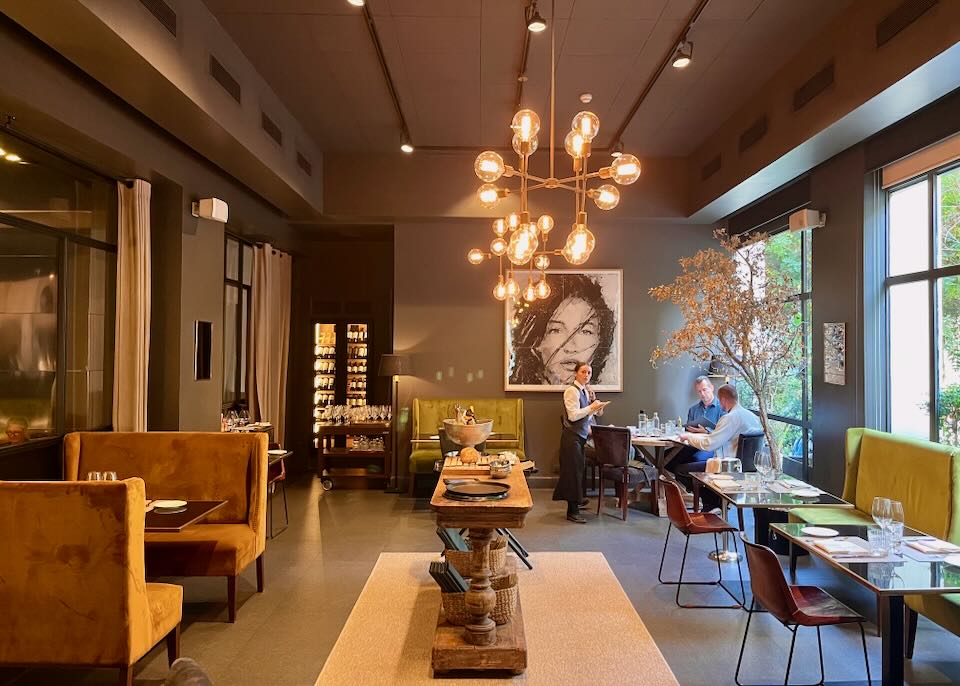
El Born’s Grand Hotel Central
- Best Hotels in El Born
Barcelona EDITION • Hotel phone: +34 936 26 33 30
Grand Hotel Central • Hotel phone: +34 932 95 79 00
Yurbban Passage Hotel & Spa • Hotel phone: +34 938 82 89 77- Best Cheap/Midrange Hotels
Chic & Basic Born • Hotel phone: +34 932 95 46 52
Ciutat de Barcelona • Hotel phone: +34 932 69 74 75
Hotel Motel One Ciutadella • Hotel phone: +34 936 26 19 00
Hotel REC Barcelona • Hotel phone: +34 935 56 99 60
Musik Boutique Hotel • Hotel phone: +34 932 22 55 44- Best Hostels
Ant Hostel • Hotel phone: +34 932 69 42 43
Born Barcelona Hostel • Hotel phone: +34 935 32 36 634. Eixample
The affluent Eixample neighborhood, north of the old city, was laid out on a grid plan in the 19th century and makes a dramatic contrast to the latter’s narrow streets and compact plazas. The boulevards here are wide and tree-lined, and are home to some of the city’s best luxury hotels and Barcelona’s most impressive Modernist architecture.
Eixample tends to attract as many locals as tourists, and as the city’s traditional hotel district, it’s a great place to stay, with excellent transport links to other districts. Gaudi’s most renowned buildings – La Pedrera (Casa Milà) and Casa Battló – are found off the main thoroughfare, Passeig de Gràcia, while the iconic yet incomplete Sagrada Familia church (construction of Gaudí’s masterpiece is expected to finish in 2026 or 2027) is a couple of blocks north of Avinguna Diagonal.
Gaudi’s La Pedrera is also known as Casa Milà
Nicknamed “Quadrat d’Or” (the Golden Square) for its high-end shopping, Eixample is also home to many designer stores along the Passeig de Gràcia and Rambla da Catalunya. To the south, the sub-neighborhood of Sant Antoni is known for its 19th-century market and the tapas and vermouth bars along Carrer del Parlament.
There is a vast selection of accommodation here, especially at the high end, with numerous luxury options. But there’s a surprisingly good choice of midrange and budget hotels here as well, including some excellent hostels.
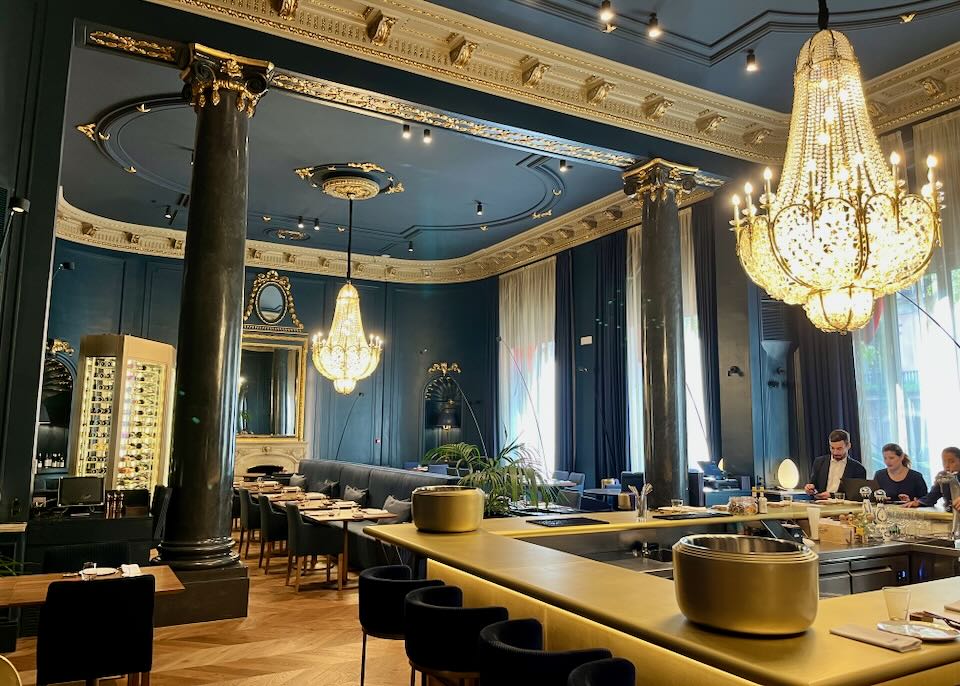
Swanky El Palace is the best of Eixample’s many 5-star hotels.
- Best Hotels in Eixample
Ca La Maria • Hotel phone: +34 648 48 67 68
Casa Sagnier • Hotel phone: +34 935 95 95 45
Claris Hotel & Spa • Hotel phone: +34 934 87 62 62
Condes de Barcelona • Hotel phone: +34 934 45 00 00
Cotton House • Hotel phone: +34 934 50 50 45
El Palace • Hotel phone: +34 935 10 11 30
H10 Casa Mimosa • Hotel phone: +34 932 14 23 30
Majestic Hotel & Spa • Hotel phone: +34 934 88 17 17
Mandarin Oriental • Hotel phone: +34 931 51 88 88
Ohla Eixample • Hotel phone: +34 937 37 79 77
Olivia Balmes Hotel • Hotel phone: +34 932 14 41 63
Sir Victor • Hotel phone: +34 932 71 12 44- Best Cheap/Midrange Hotel
B Hotel • Hotel phone: +34 935 52 95 00
Hostal Oliva • Hotel phone: +34 934 88 01 62
Mihlton Barcelona B&B • Hotel phone: +34 608 16 16 61
Praktik Rambla • Hotel phone: +34 933 43 66 90- Best Hostel
Fabrizzios Terrace • Hotel phone: +34 931 62 16 12
Onefam Batlló • Hotel phone: +34 931 78 43 43
Sant Jordi Rock Palace • Hotel phone: +34 934 53 32 81
Pars Tailor’s Hostel • Hotel phone: +34 932 50 56 845. Gràcia
Once its own separate village, Gràcia was incorporated into Barcelona in 1897, though it retains a distinctive low-key, bohemian vibe. This quiet neighborhood, home to young families, artists, and ex-pats, sits on a gentle slope between Eixample and the hills to the north of the city. Gràcia’s biggest attraction is Parc Güell, one of Gaudí’s biggest Modernist creations; an imaginatively landscaped, hilly park full of colorful tilework edifices, including the home in which the architect himself lived from 1906 until 1925 (Casa Museu Gaudí).
Parc Güell
Gràcia is also known for its independent fashion stores, many of them clustered along Carrer de Bonavista, while Carrer de Asturies and the adjoining Carrer del Torrent de l’Olla are lined with hip bars, ethnic restaurants, and quirky shops. The neighborhood is a lot less touristy than the districts to the south – soak up the vibes in Plaça del Sol, or under the distinctive clock tower of Plaça de la Vila de Gràcia.
Gràcia contains plenty of hotels in its southern half; these are cheaper than those in the old center because of their longer distance from the main sights, but you’ll feel more like a local staying here. It also boasts some of the best hostels in the city.
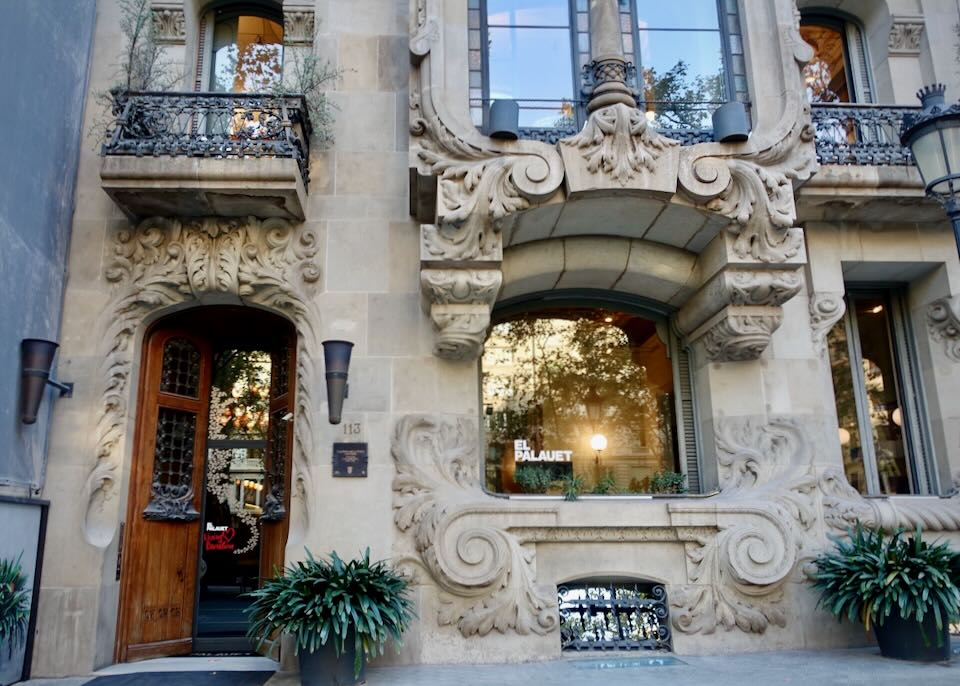
The fabulous El Palauet Royal Suites in Gràcia.
- Best Hotels in Gràcia
Casa Fuster • Hotel phone: +34 932 55 30 00
El Palauet • Hotel phone: +34 932 18 00 50
Seventy Barcelona • Hotel phone: +34 930 12 12 70
Well And Come • Hotel phone: +34 937 37 97 99- Best Cheap/Midrange Hotels
Be Mate Paseo de Gracia • Hotel phone: +34 935 22 28 40
Casa Gràcia • Hotel phone: +34 931 74 05 28- Best Hostels
Casa Jam Barcelona • Hotel phone: +34 933 15 53 38
Factory Hostels • Hotel phone: +34 932 85 22 56
Rocket Hostels • Hotel phone: +34 936 24 22 59
Yeah Barcelona • Hotel phone: +34 935 31 01 356. Poble Sec
Poble Sec is a young and trendy neighborhood spread along the foothills of Montjuïc and across Avenida de Paral·lel from El Raval and Sant Antoni. It’s ideal for visiting attractions on Montjuïc and has an excellent dining scene and nightlife, with a high concentration of live music venues and tapas bars lining the leafy Carrer de Blai.
This is a relatively small district with only a smattering of hotels and hostels, but most offer good value. It’s served by the Poble Sec, Plaça d’Espanya, and Paral·lel metro stations.
- Best Hotels in Poble Sec
Hotel Brummell • Hotel phone: +34 931 25 86 22
InterContinental Barcelona • Hotel phone: +34 934 26 22 23- Best Cheap/Midrange Hotel
Hotel Paral·lel • Hotel phone: +34 933 29 11 04- Best Hostels
HelloBCN Hostel • Hotel phone: +34 934 42 83 92
Onefam Paralelo • Hotel phone: +34 934 43 98 857. Montjuïc
Rising above the port and the sea, ‘Jewish Mountain’ has been the symbol of Barcelona since ancient times. The fortress at the top of the hill is a superb lookout point with tremendous views over the city, and Montjuïc’s landscaped parks and botantical gardens are ideal for hours of wandering. Also on the hill are the Olympic stadium and its small museum (next to Santiago Calatrava’s curvy communications tower), Poble Espanyol (Spanish Village), and two of the city’s heavyweight art museums: Fundació Joan Miró and the Museu Nacional d’Art de Catalunya – the latter housed inside the impressive Palau Nacional (national palace) and featuring a precious collection of Romanesque Catalan art.
Fundación Joan Miró
The fortress, parks, and Fundació Miró are easily reachable via funicular and cable car from Paral·lel metro stop, though the main approach to Montjuïc is from Plaça Espanya. Grand buildings from the 1929 International Exhibition line the pedestrian boulevard that leads to the Magic Fountain; in the summer months, there is a sound-and-light show here in the evenings. Beyond, escalators take you up to Palau Nacional.
Apart from the Miramar on the northern slopes, there are no hotels on the hill itself, though there are some upscale options to the south in L’Hospitalet de Llobregat, around the Fira Barcelona (a major trade show venue). You’ll find a lot more choice in neighboring Poble-Sec.
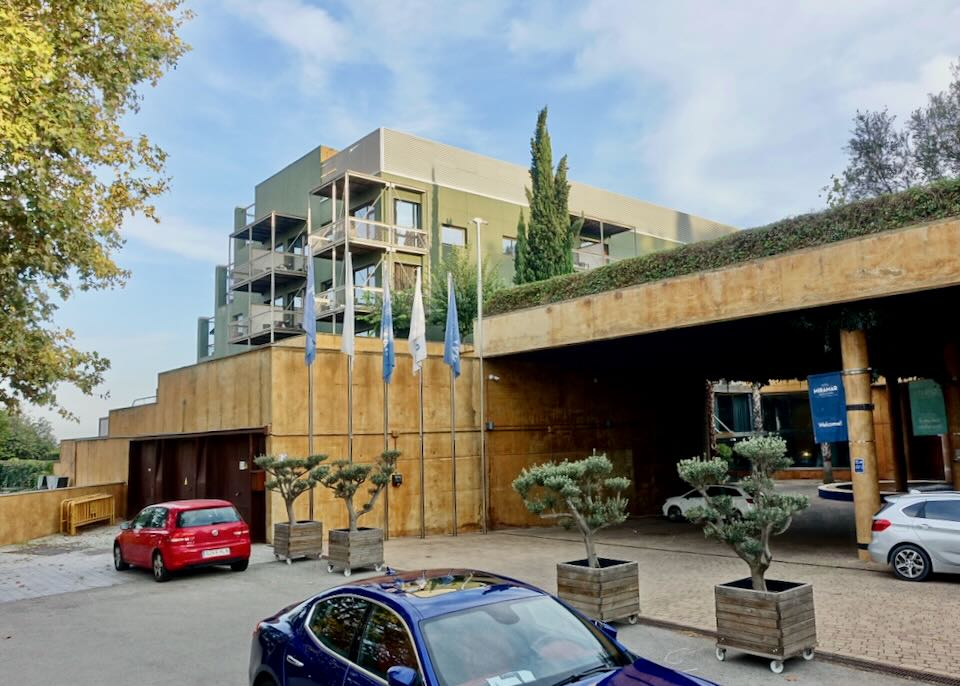
The 4-star contemporary Hotel Miramar is the only hotel located on Montjuïc itself.
- Best Hotels in Montjuïc
Hotel Porta Fira • Hotel phone: +34 932 97 35 00
Leonardo Royal Hotel Fira • Hotel phone: +34 930 88 28 00
Miramar • Hotel phone: +34 932 81 16 00
Renaissance Fira • Hotel phone: +34 932 61 80 008. Barceloneta, Port Vell, & Port Olímpic
Formerly the old fishermen’s quarter, Barceloneta sits a short walk away from the southern end of La Rambla, south of El Born and next to the revitalized Port Vell marina district filled with yachts of the global glitterati. This largely working-class neighborhood manages to maintain its down to earth vibe, and its narrow streets are lined with low-key neighborhood tapas, bodegas, and some of the best seafood restaurants in the city. Before the 1992 Olympics, it was known solely for its ramshackle waterside restaurants; since then, the restaurants have been demolished and the shore cleaned up, and now Barceloneta’s big attraction is its wide, sandy beach that stretches for miles – its bustling promenade always busy with families, joggers, and rollerbladers. The Barcelona Aquarium, next to the marina, is popular with families and schoolchildren, and the cable car that crosses Barcelona’s harbor to reach Montjuïc departs from near the beach.
The Rambla De Mar walkway crosses the harbor, providing a view of the bustling Port Vell waterside; there are numerous bars and restaurants here, as well as the huge Museu d’Història de Catalunya, with more development expected in future years. The Barcelona Maritime Museum, preserving some of the medieval port buildings, lies nearby at the end of La Rambla.
Museu d’Història de Catalunya
A little further north along the coast, Port Olímpic is another plush marina fringed by a couple of beaches and several bars, restaurants, and nightclubs. It is especially lively in the spring and summer. The Barcelona Photo Center (KBr Fundació MAPFRE) is also here, as well as Casino Barcelona and the city’s tallest skyscrapers: Hotel Arts and Torre Mapfre (both 505ft/154m). Don’t miss the giant steel goldfish sculpture by Frank Gehry in front of Hotel Arts, created for the 1992 Games.
Apartment rentals are more common than hotels in this up-and-coming seaside area, especially in Barceloneta. Of the hotels available, those facing the sea are usually very expensive.
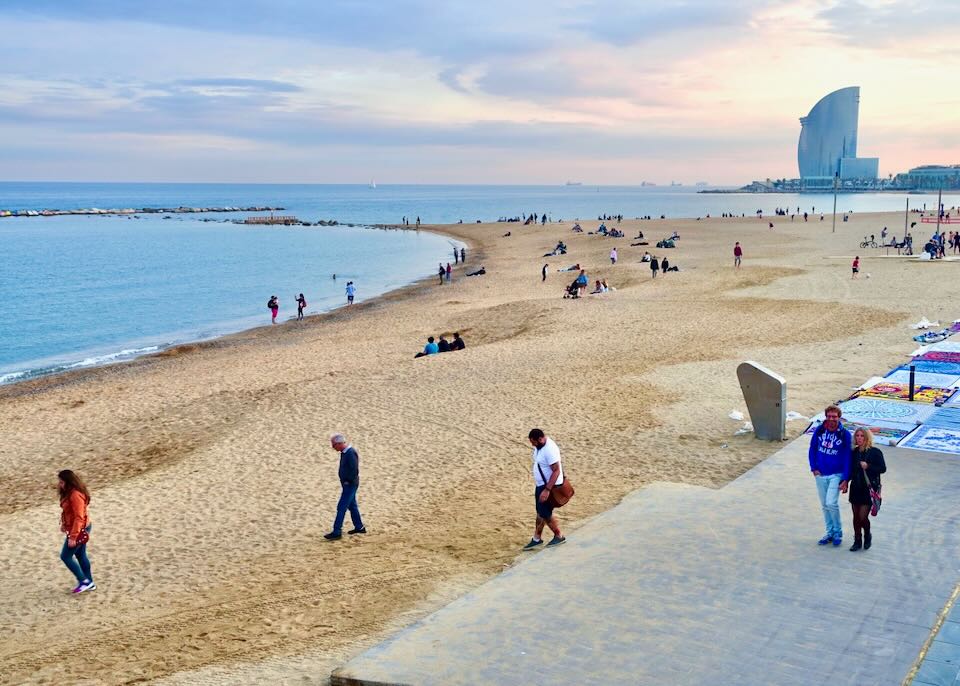
The crescent-shaped W Hotel rises like a sail above Barceloneta Beach.
- Best Hotels in Barceloneta, Port Vell, & Port Olímpic
H10 Port Vell • Hotel phone: +34 933 10 30 65
Hotel 54 Barceloneta • Hotel phone: +34 932 25 00 54
Hotel Arts • Hotel phone: +34 932 21 10 00
Sofitel Barcelona Skipper • Hotel phone: +34 932 21 65 65
W Hotel • Hotel phone: +34 932 95 28 00- Best Cheap/Midrange Hotels
Hotel Oasis • Hotel phone: +34 933 19 43 96- Best Hostel
Unite Hostel • Hotel phone: +34 930 18 66 609. Poblenou & Diagonal Mar
Just north of Barceloneta along the coast, Poblenou and Diagonal Mar are old industrial districts where decrepit warehouses have given way to sleek office buildings, contemporary design hotels, industrial-scale nightclubs, and trendy beach bars. Poblenou has the city’s best and cleanest beaches and is particularly popular with businessmen and night owls looking to party. Its main thoroughfare is the pedestrianized boulevard of Rambla de Poblenou, which runs inland from the coast; the streets branching off it are where you’ll find a mix of traditional restaurants and cafes, as well as hip cocktail bars, specialist coffee shops, and contemporary fusion eateries. Poblenou’s one downside is that it’s quite far from most of Barcelona’s attractions.
The adjacent convention and business district of Diagonal Mar is Barcelona at its most modern, with skyscrapers, a huge shopping mall, the International Barcelona Convention Center, and giant trade show venue Parc del Fòrum. Diagonal Mar’s main attraction is the family-friendly Museum of Natural Sciences of Barcelona. Trams run along Avinguda Diagonal from here to Plaça de les Glòries Catalanes, home of the iconic cigar-shaped Torre Glòries by Jean Nouvel, and the Disseny Hub design museum.
Barcelona’s Museum of Natural Sciences
There are a few hotels along the coast and further inland here, but quality is hit or miss. Most hotels are a stiff walk from the nearest metro station, so staying here you are more likely to rely on trams or buses.
- Best Hotels in Poblenou & Diagonal Mar
Hilton Diagonal Mar • Hotel phone: +34 935 07 07 07
Novotel Barcelona City • Hotel phone: +34 933 26 24 99
The Level at Meliá Sky • Hotel phone: +34 933 67 20 80- Best Cheap/Midrange Hotels
Hostal Poblenou • Hotel phone: +34 932 21 26 01
ibis Barcelona Glories 22 • Hotel phone: +34 933 00 77 77
ibis Styles Bogatell • Hotel phone: +34 934 83 37 48
Social Hub Barcelona • Hotel phone: +34 932 20 72 79- Best Hostel • Hotel phone:
Jacob’s Inn • Hotel phone: +34 644 40 37 81More Barcelona Neighborhoods
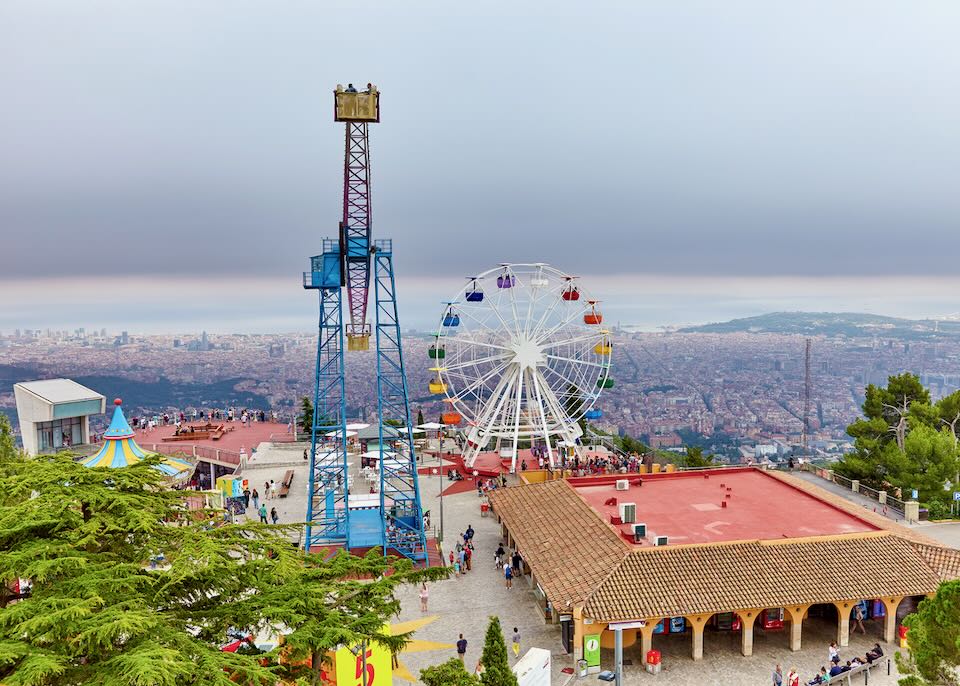
View over Barcelona from Tibidabo Amusement Park.
We’ve covered our favorite neighborhoods to visit and stay in more detail below, but with more time these districts are also worth checking out.
- Tibidabo: For the best views across the whole of Barcelona, take the tram and funicular to the peak of Tibidabo, at the western edge of the city. Families come up here to enjoy the old-school amusement park, the Parc d’atraccions Tibidabo, or the science museum at the base of the hill, the Museu de la Ciència Cosmo Caixa. There are also plenty of beautiful walks and trails beyond the amusement park in the wooded Parc de Collserola. Excellent places to stay up here include Anita’s Bed and Breakfast, METT, ABaC Restaurant Hotel, and Hotel Mirlo, though none of them are convenient for exploring the rest of the city.
- FC Barcelona at Camp Nou: One of the world’s best soccer teams is based at the legendary Camp Nou stadium, west of the city center in Les Corts district. Fans can tour the stadium and visit the FC Barcelona Museum. The best hotels nearby are the Grand Hyatt Barcelona and NH Barcelona Stadium, but there’s no need to spend the night out here. Note that the local Collblanc metro station becomes jam-packed on match days.
- There’s not much point in staying near Barcelona-El Prat Airport southwest of the city unless you have an early flight – the nearest hotels are nothing special. If you do need to stay here due to a very late or early flight, the Sleep&Fly inside Terminal 1 is adequate and is very convenient. Otherwise Hotel Barcelona Aeropuerto and the cheaper (but further away) Best Western Plus Alfa Aeropuerto aren’t bad.
Barcelona Travel Tips
- Barcelona-El Prat Airport is only about 9 miles (15km) southwest of the city center. As the second largest airport in Spain, it’s well connected to cities all over the world. American, Delta, budget carrier Level, and United all offer non-stop flights between here and the USA. Metro (€5.15) and regular trains zip into the city, but depending on where you’re staying, you’ll likely have to change once or twice. A taxi into town will usually cost €30–40 (on the meter).
- Almost everyone you are likely to deal with in cosmopolitan Barcelona will be able to speak (or at least understand some) English, except for a few taxi drivers and owners of small cafés/shops. The city has two official languages, Catalan and Spanish, and though street names and most road signs are in Catalan, it’s fine to use Spanish (most locals are bilingual).
- There are several tourist passes on offer for Barcelona; as always these are good value only if you intend to do a lot of sightseeing in a short amount of time. Given how busy Barcelona is, the ability to gain fast track entry is a plus. The Barcelona Card is the official tourist pass of Barcelona. It provides free unlimited use of public transport, free entry to over 25 museums and attractions (but NOT the Sagrada Familia), “skip the line” benefits, and other discounts. Prices range from €48 for 3 days to €63 for 5 days. This can save you a lot, but be realistic about how much you can pack in to 3 days (it’s generally not worth buying it if you’re here for less than that). The Go City Barcelona Pass and Barcelona City Pass DO include the Sagrada Familia, but cost a lot more. If you intend to pack in the major sites over a minimum three days, 8 hours a day, the Go City Barcelona Pass is probably the best option, but the only way to pick the right pass is to come up with an itinerary and compare savings pass by pass – tedious but effective.
- Free wi-fi is available at Barcelona airport, and at cafés, city buses, metro stations, most parks, and museums through the city itself. The free “Barcelona WiFi” service also offers hot spots throughout the city center.
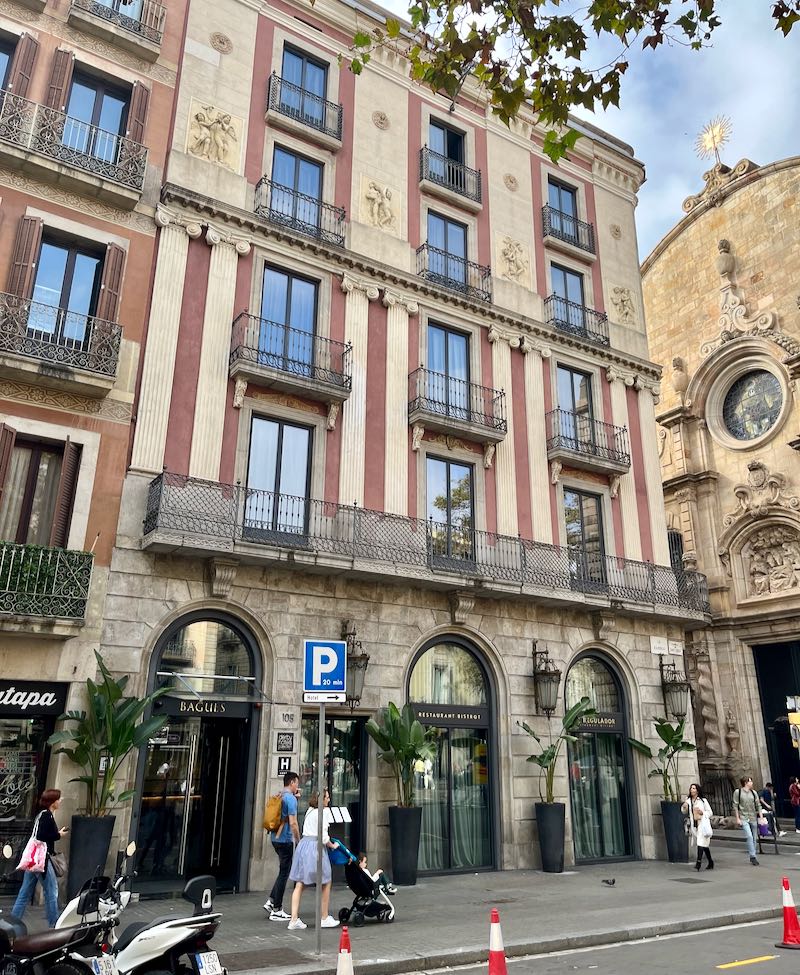
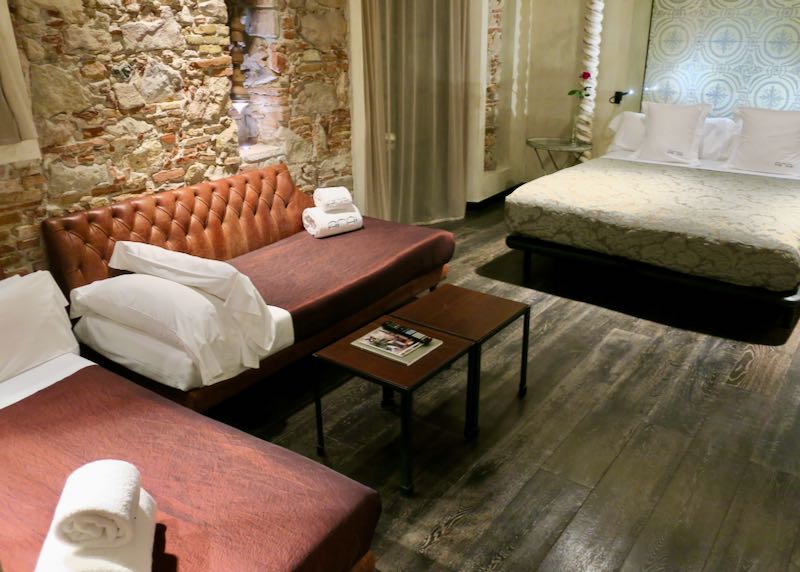
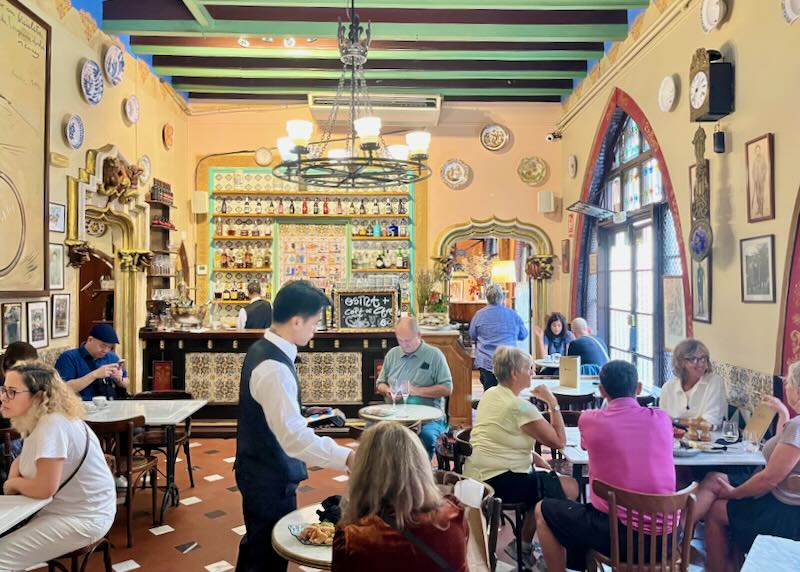
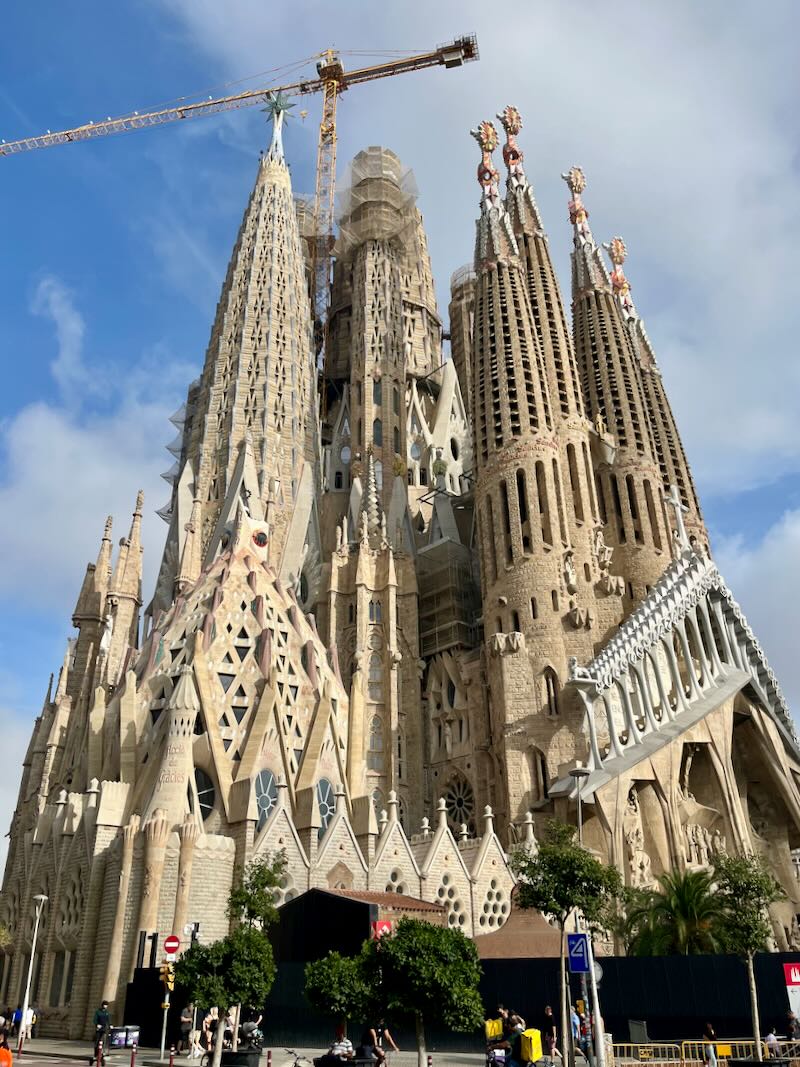
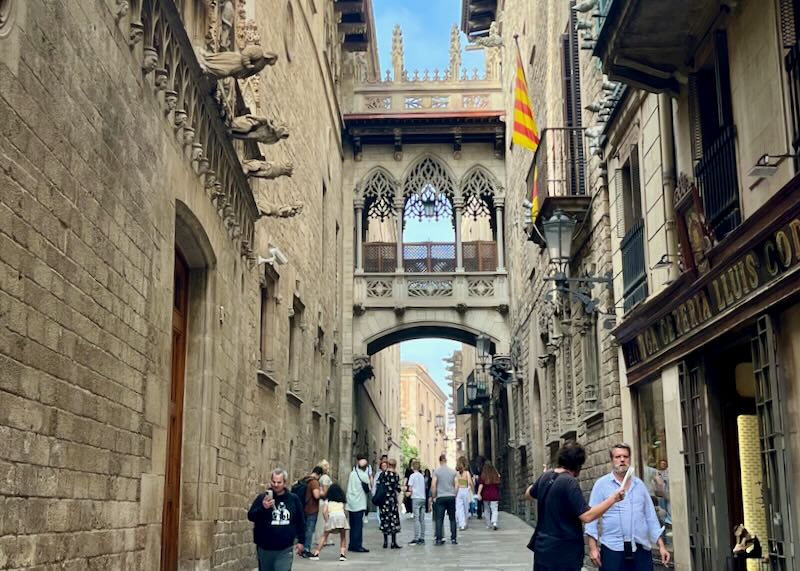

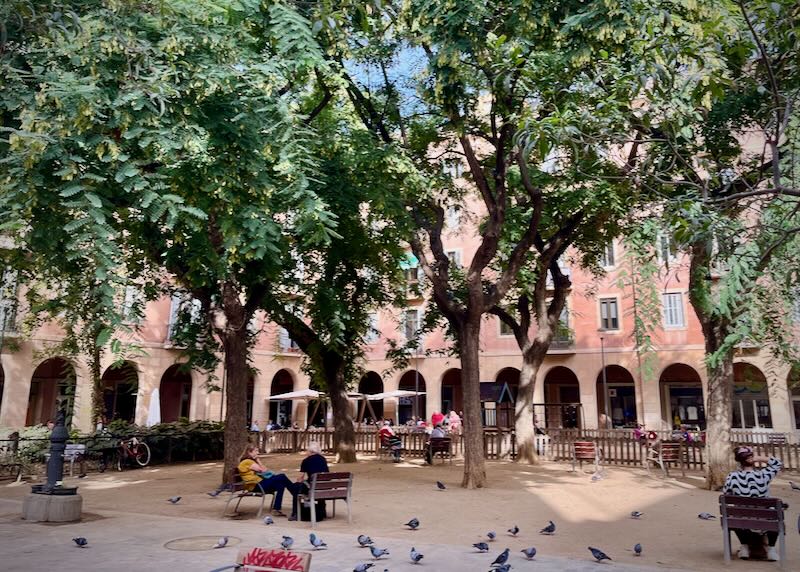

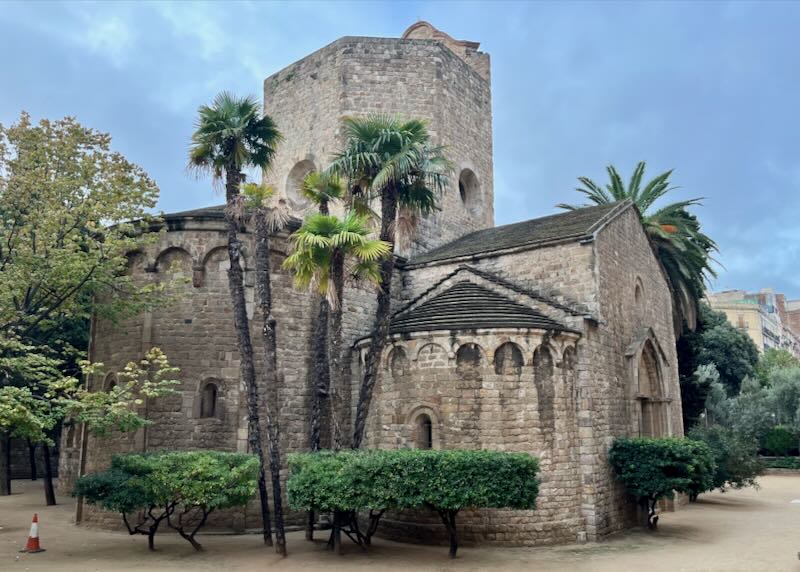
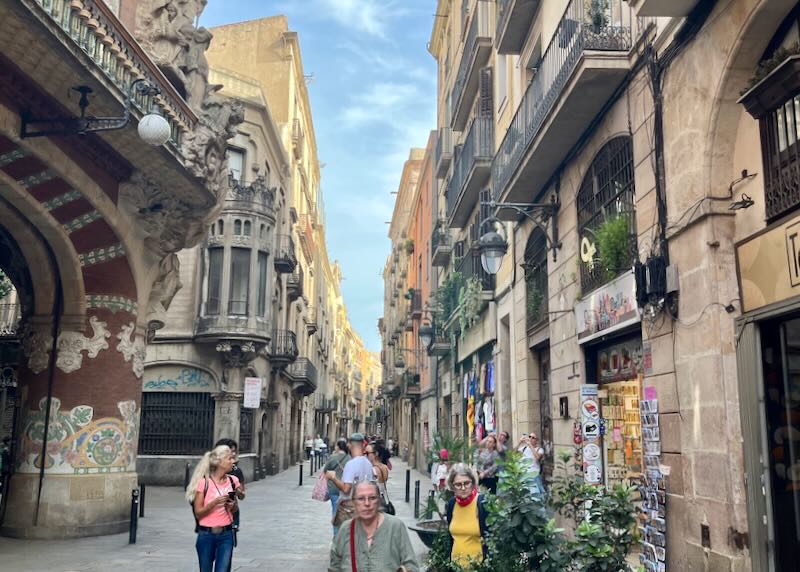

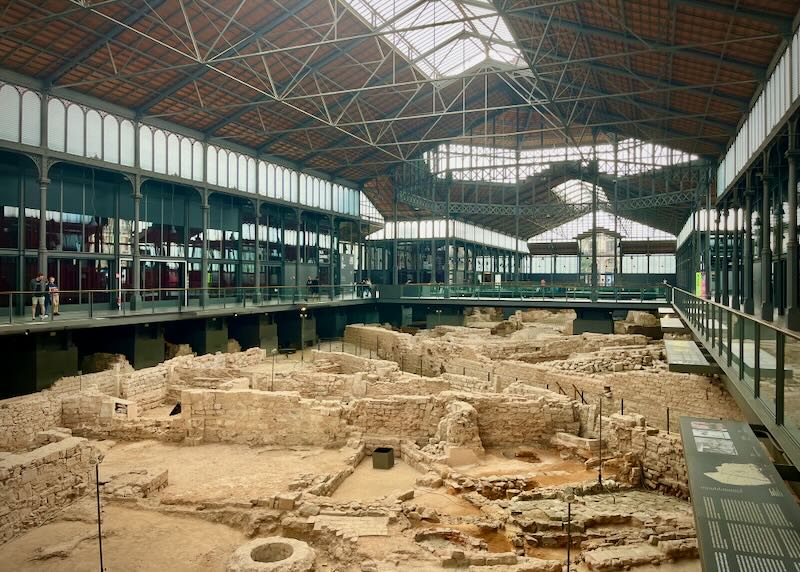
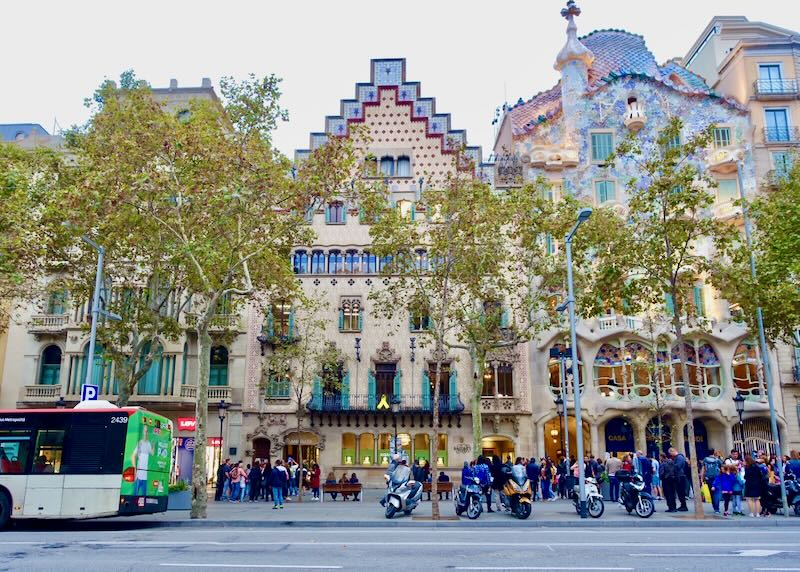

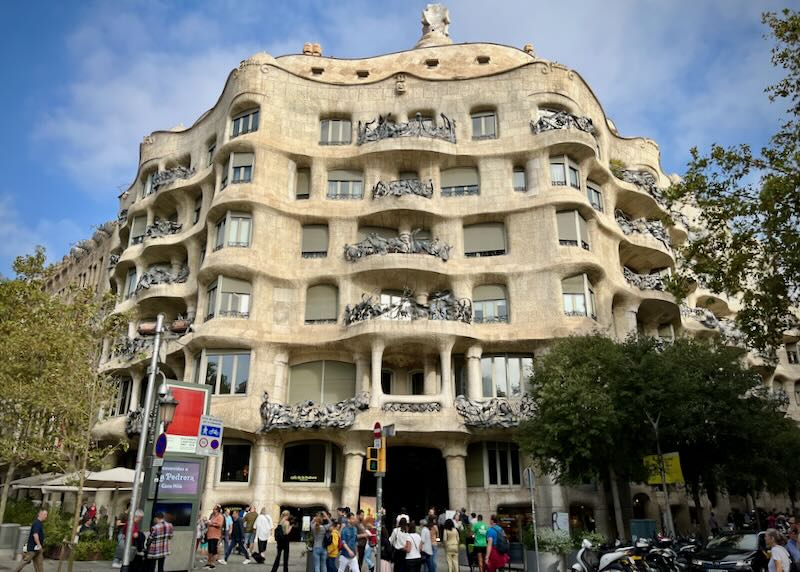
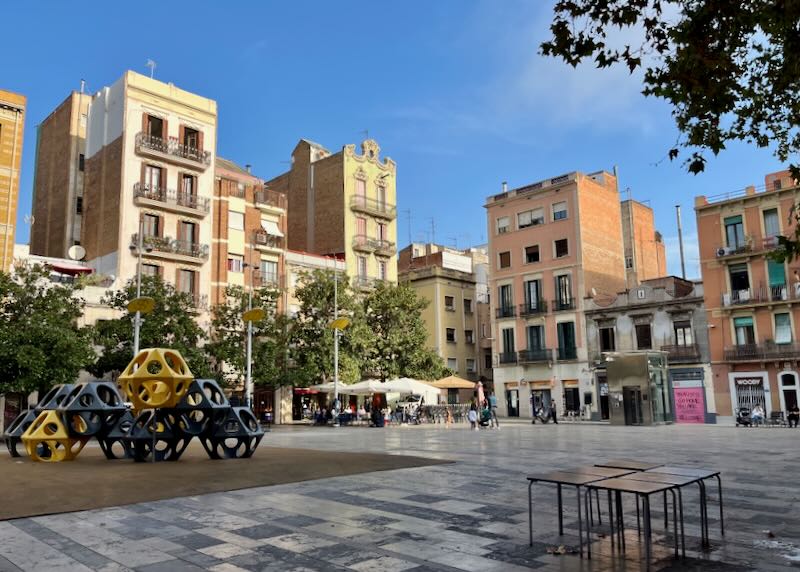


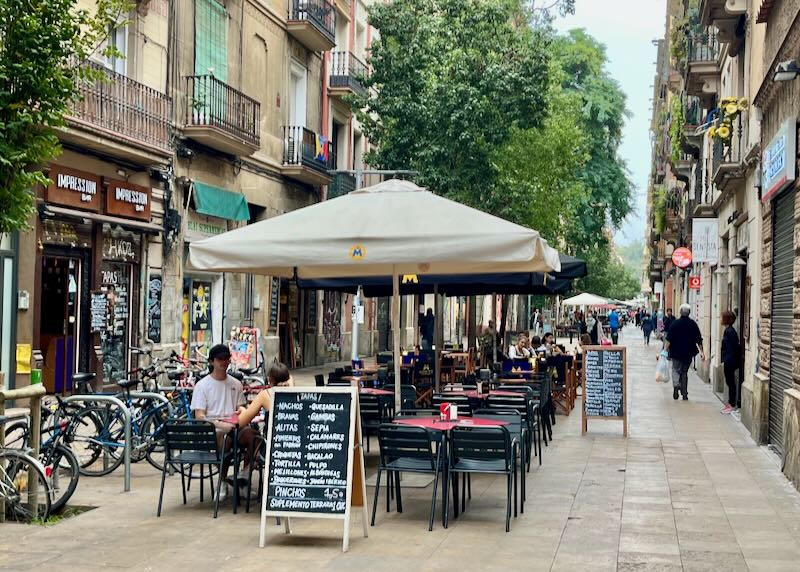

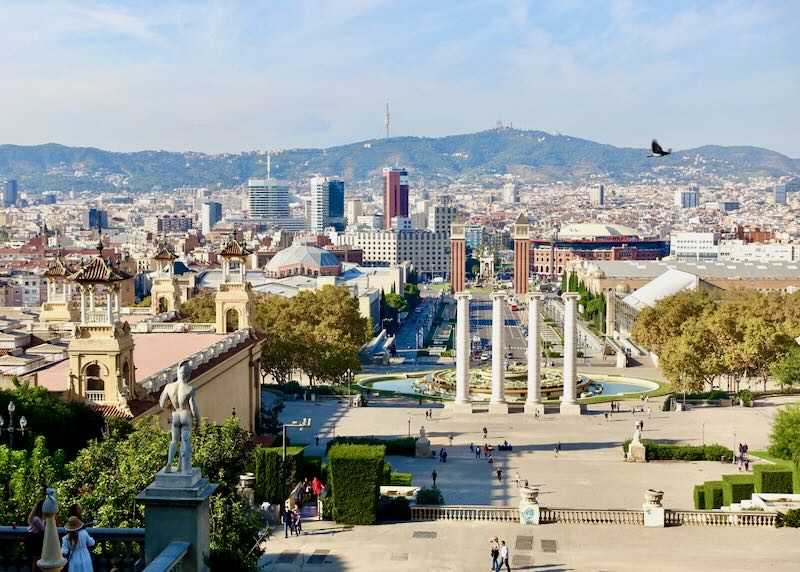

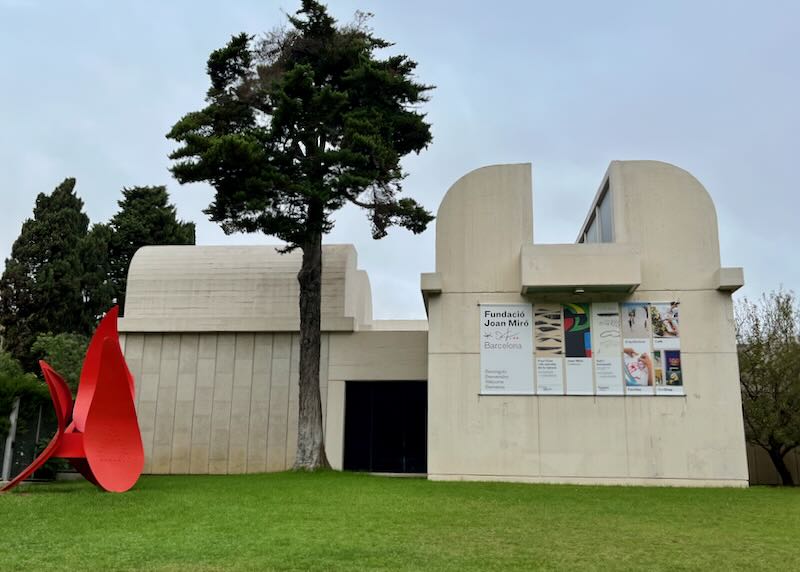
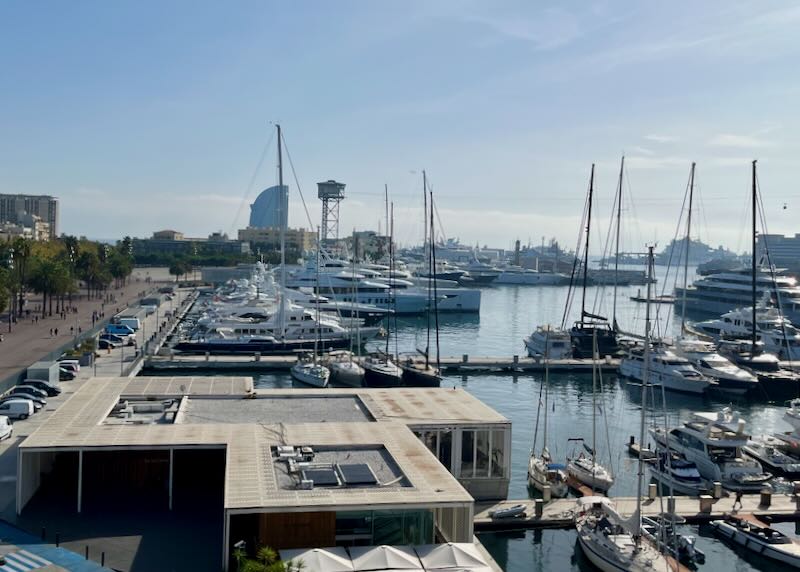

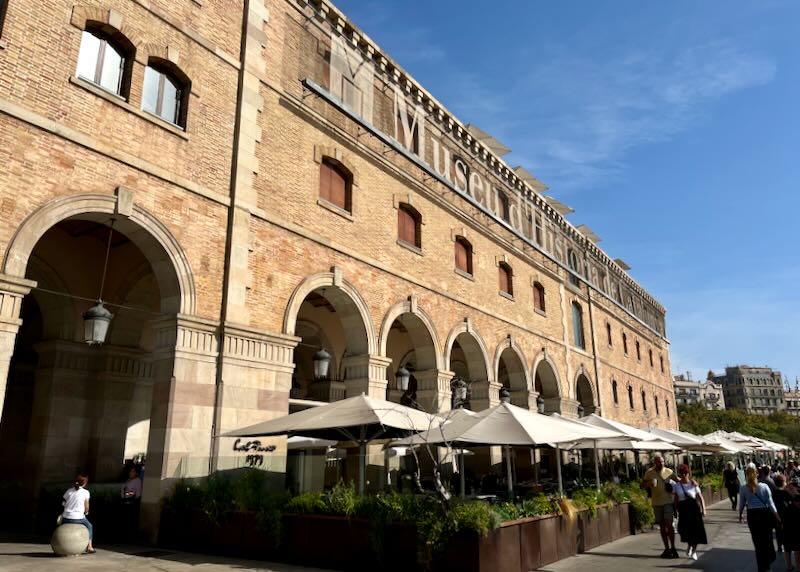
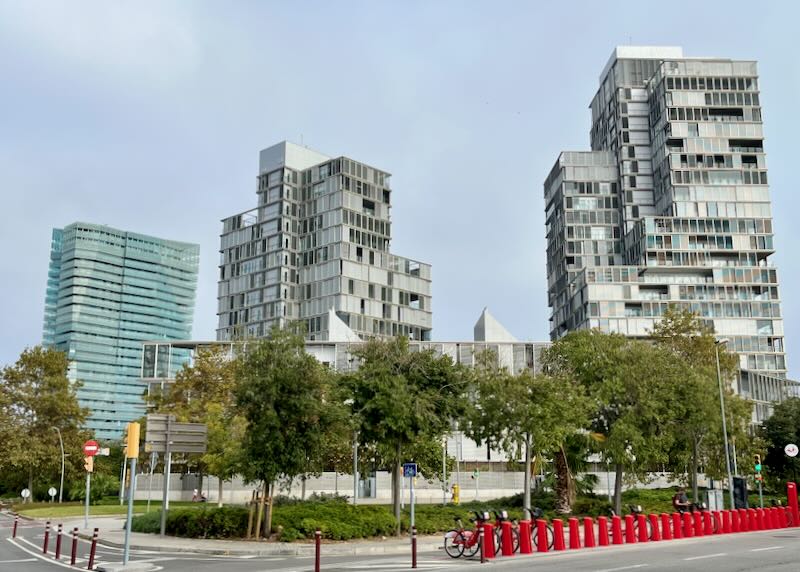

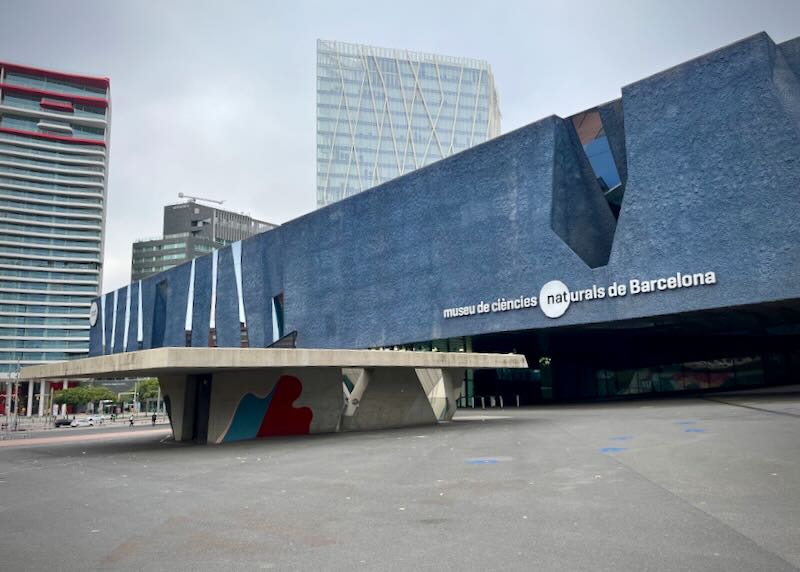
About Santorini Dave